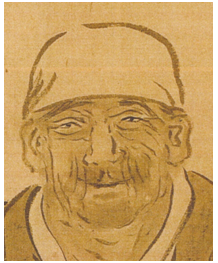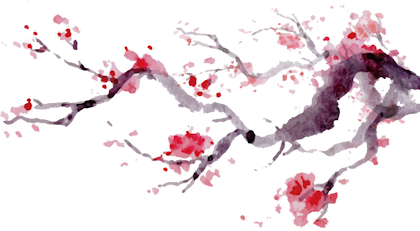Basho's thoughts on...
Matsuo Basho 1644~1694
The only substantial
collection in English
of Basho's renku, tanka,
letters and spoken word
along with his haiku, travel
journals, and essays.
The only poet in old-time
literature who paid attention with praise
to ordinary women, children, and teenagers
in hundreds of poems
Hundreds upon hundreds of Basho works
(mostly renku)about women, children,
teenagers, friendship, compassion, love.
These are resources we can use to better
understand ourselves and humanity.
Interesting and heartfelt
(not scholarly and boring)
for anyone concerned with
humanity.
“An astonishing range of
social subject matter and
compassionate intuition”
"The primordial power
of the feminine emanating
from Basho's poetry"
Hopeful, life-affirming
messages from one of
the greatest minds ever.
Through his letters,
we travel through his mind
and discover Basho's
gentleness and humanity.
I plead for your help in
finding a person or group
to take over my 3000 pages of Basho material,
to edit and improve the material, to receive 100%
of royalties, to spread Basho’s wisdom worldwide
and preserve for future generations.
Quotations from Basho Prose
The days and months are
guests passing through eternity.
The years that go by
also are travelers.
The mountains in silence
nurture the spirit;
the water with movement
calms the emotions.
All the more joyful,
all the more caring
Seek not the traces
of the ancients;
seek rather the
places they sought.
basho4humanity
@gmail.com
Plea for Affiliation
Plea For Affiliation
I pray for your help
in finding someone - individual, university,
or foundation - to take over my
3000 pages of material, to cooperate with me
to edit the material, to receive all royalties
from sales, to spread
Basho’s wisdom worldwide, and preserve for
future generations.
basho4humanity
@gmail.com
Home >
Topics >
Basho Tsukeku 芭蕉付句 > K-10
Basho Tsukeku 10 A
Summer 1694 to early winter death; 日本語の原文
Legend:
Words of Basho in bold
Words of other poets not bold
Father and son-in-law
Things from lacquered box 10: 21
むこと舅の / なおる挨拶
御局の / 里下りして /涙ぐみ
ぬったはこより / 物のだし入れ
Muko to shuuto no / naoru aisatsu
o-tsubone no / sato kudari shite / namida gumi
nutta hako yori / mono no dashi ire
Village embraced
All the folks I meet 10: 28
抱き込んで / 松山広き /有明に
会う人ごとに /魚くさきなり
Dakikonde matsu yama hiroki ariake ni
Au hito goto ni / sakana kusaki nari
When only half-assed,
You so sleepy 10: 45
尻もむすばぬ恋ぞほぐるる
うとうとと夜すがら君を追行
Shiri mo musubanu / koi zo hogururu
Uto uto to / yo sugara kimo o / oi aruku
From back door to village
Enough to eat, 10: 60
藪から村へ / ぬけるうら道
食うかね / 婿も舅も / 口きいて
Yabu kara mura e / nukeru ura michi
Kuukanenu / muko mo shuuto mo / kuchgi kiite
Facing into the wind
Plump and healthy 10: 76
Exhaustion from Edo
真向きの風に / 顔をふかるる
よう肥えた / むすこのすわる / ひざの上
そろそろ江戸の / 草臥が来る
Ma-muki no kaze ni / kao o fukaruru
You koeta / musuko no suwaru / hiza no ue
Soro soro Edo kara / kutabiri ga kuru
In the year 1694, on August 11, at the tea hut of Bokusetsu in Otsu:
With autumn near
Disorderly drooping
秋ちかき 心の寄るや 四畳半
しどろに伏せる 撫子の露
Aki chikaki / kokoro no yoru ya / yojouhan
Shidoro ni fuseru / nadeshiko no tsuyu
Incessantly
Wipe and breathe on hands 10: 88
降りまじる / あられみぞれの / 一しきり
手のひらふいて / 糊ざいくする
Orimajiru / arare mizore no / hito shikiri
Te no hira fuite / nori zaiku suru
Socks taken off to air
At New Years 10: 92
Though meaning is hidden
complexion
Upon tatami the lute 10: 93
足袋ぬいで干す / 書のかげろう
年長に /ちいさきやつら / 供させて
隠すたよりを / 立ちながら聞く
行燈の /上より白き / 顔つき
畳に琵琶を / どつかりと置く
Tabi nuide hosu / kaki no kagerou
Nenchou ni / chiisaki yatsura / tomo sasete
Kakusu tayori o / tachinagara kiku
Andon no / shita yori shiroki / hitai tsuki
Tatami ni biwa o / dotsukari to oku
Vulgar words to insult
All the guests 10: 95
嫁とむすめに / わる口をこく
客は皆 /さむくてこおる / 火燵の間
Yome to musume ni / waruguchi o toku
Kyaku wa mina / samukute kooru / kotatsu no ma
For a while rafts man
Pilgrim-robed 10: 110
暫く岸に / 休む筏士
衣着て/ 旅する心 / 静也
Shibaraku kishi ni / yasumu ikadashi
Koromo kite / tabi suru kokoro / shizuka nari
The monk praises the child
Winter-withered 10: 156
Hardly ever used
ならいのわるき /子を誉める僧
冬枯れの /九年母おしむ /霜覆ひ
たまたますれば /居風呂の漏り
Narai no waruki / ko o homeru sou
Fuyu kare no / kyunenbou oshimu / shimo ooi
Tama tama sureba / i-buro no mori
Showing no signs
Three years have passed 10: 169
いそがしき /体にも見えず /木薬や
三年立ど/ 嫁が子のなき
Isogashiki / tei ni mo miezu / kigusuri ya
Sannen tatedo / yome ga ko no naki
Frantically
Carpenters and roofers 10: 182
せりせりと / なく子を畚に /つきすえて
大工屋根やの / 帰る暮れどき
Serizeri to / naku ko o fugo ni / tsukisuete
Daiku yaneya no / kaeru kure-doki
Wind from the east
blows from the west, then
from the north
The pulse in my wrist 10: 204
こち風の /又西に成り / 北になり
わが手に脈を /大事がらるる
Kochi kaze no / mata nishi ni nari / kita ni nari
Waga te ni myaku o / daiji gararuru
Bright red cockscomb
To quiet down 10: 208
Night sweats have stopped
Carpenters start to work 10: 208
赤鶏頭を/ 庭の正面
定らぬ /娘の心 / 取しづめ
寝汗のとまる / 今朝がたの夢
鳥籠を /づらりとおこす / 松の風
大工づかいの / 奥にきゆる
Aka keitou o / niwa no shoumen
Sadamaranu / musume no kokoro / tori shizume
Ne-ase no tomaru / kesa gata no yume
Tori kago o / zurari to okosu / matsu no kaze
Daiku zukai no / oku ni kikiyuru
Hulling rice,
By myself jostling through 10: 209
米搗も / けふはよしと / 帰るなり
から身で市の / 中を押しあう
Kome mo / kyou wa yoshi tote / kaeru nari
Kara mi de ichi no / naka o oshi-au
At the village square
Women only 10: 217
Children they pamper
村の出見世に/ あつめてねる
嫁とりは /女斗で / 埒をあけ
大事がる子の / 秋の霜やけ
Mura no demise ni / atsumete neru
Yome tori wa / onago bakari de / rachi o ake
Daijigaru ko no / aki no shimo yake
The sun sets
More than laughter 10: 235
“Laundry’s late!”
日は入れて /やがて月さす / 松の間
笑う事より / 泣きがながすみ
洗濯の / おそきを斎で / せつかるる
Hi wa irete / yagate tsuki sasu / matsu no ai
Warau koto yori naki ga nagasumi
Sentaku no osoki o toki de setsukaruru
This path –
Rocky mountain farm
此道や / 行人なしに / 秋の暮れ
祖の畠の / 木にかかる蔦
Kono michi ya / yuku hito nashi ni / aki no kure
Soba no hatake no / ki ni kakaru tsuta
White chrysanthemum 10: 261
Morning moon makes water
白菊の / 眼に立て見る / 塵もなし
紅葉に水を / 流すあさ月
Shirogiku no /me ni tatete miru / chiri mo nashi
Momiji ni mizu o / nagasu asa tsuki
New house being built, 10: 264
Determined
普請のうちは /小屋で火を焼く
帰らぬに/ 極めるの嫁の /さめすまし
Fushin no uchi wa / koya de hi o taku
Kaeranu ni / kimeru no yome no / samesumashi
Here ends the chronological BRZ,
Stanza-pairs at the end of volume 10 stand alone, usually both by Basho, undated.
To hone his renku art, Basho, by himself, practiced writing both stanzas.
Ashes inside censer 10: 281
香炉の灰の /しめる 長雨
しおらしく / かいこのめくち /見え初めて
Kouko no hai no / shimeru naga-ame
Shiorashiku / kaiko no me guchi / mie-somete
A melon so big
Scraps cut off 10: 307
二人していざ /大きなる瓜
裁ち物の/ 麻にきれ端 /よろこびて
Futari shite iza / ouki naru uri
Tachi mono no / asa ni kire hata / yorokobite
Among cotton bursting out 10: 312
綿ふきありく/ 猫の真城
人しらぬ / 中を炬燵に / もたれ合
Wata fuki ariku / neko no mashiro
Hito shiranu / naka o kotatsu ni / motare au
Although summer 10: 313
夏ながら / 襟ふるふると /ものおもい
祈るしろしの / かいなくもあれ
Natsu nagara / eri furufuru to / mono omoi
Inoru shiroshi no / kai naku mo are
Stones and trees 10: 317
石も木も俤といえば拝むなり
汁椀すすぐ二度の喰え物
Ishi mo ki mo / omokage to ieba ogamu nari
Shiru wan susugu / nido no kue mono
“Lingering on . . .” 10: 318
名残ぞと / 取置 雛の / 顔をみて
また泣入りし / 労咳のせき
Nagori zo to / tori oku hina no / kao o mite
Mata naki irishi / rougai no seki
Left or right 10: 319
右左 /膳をすえても / 淋しくて
何にもかにも/うきは兼房
Migi hidari / zen o suete mo / sabishikute
Nan ni mo ka ni mo / uki wa Kanefusa
Quiet temple, 10: 321
庵寺の / 縁に筵を / 打ち敷きて
はかりてわたす / 薬代のまめ
Andera no / en ni mushiro wo / uchi shikite
Hakarite watasu / yaku kawari no mame
Bold stanzas signed by Basho yet scholars have doubts author that he actually wrote them.
While crossing this river 11: 73 I meet my deceiverFrom the Deep North
Who shall pick up love 11: 74
此川越えは /うき人に逢う
みちのくの/ 千引の石も /こころあれ
かく捨てし世を / 誰ひろう恋
Kono kawa goe wa / uki hito ni au
Michinoku no / chibiki no ishi mo / kokoro are
Kaku suteshi yo o / taga hirou koi
Battle lost, 11: 91
Once again night falls
負軍 /功者に引て / かえる也
ふたたび暮るる /霧の明方
Makeikusa / kousha ni hikite / kaeru nari
futatabi kururu / kiri no akegata
Watching by lantern
Taking a wife 11: 94
てうちん見ゆる / 町の入口
女房よぶ /米屋の亭主 / 若やぎて
Chouchin miyuru / machi no iriguchi
Nyobou yobu / komeya no teishu / wakayagite
Steadily growing taller 11: 97
Just one time
Purifying self with water 11: 98
ずんずとのびる /男兄弟
一度は / 江戸を見たがる /小あきない
みたらし汲んで /神の門前
Zunzu to nobiru / otoko kyoudai
Ichido wa / Edo o mitagaru / ko akinai
Mitarashi kunde / kami no mon mae
Tsukeku found in Akabane’s “Treasured Words of Basho” (芭蕉遺語集) in the Gakumoto Basho Zenshu.
Floating grasses
Child of an ama diver Gaku: 287
うき草を / つかねて枕 / さだめけり
あまの子なれば / 舟に乳をのむ
Uki kusa o / tsukanete makura / sadamekeri
Ama no ko nareba / fune ni chi o nomu
Lilies of the field Gaku: 371
三日月の / かげに笹百合 /さきならい
お子様がたを / 何にたとえむ
Mikazuki no / kage ni sasa / yuri sakinarai
o-kosama gata wo / nani ni tatoemu
Basho’s several hundred poems about women, children, friendship, love, and compassion are,
I believe, the most pro-female, child-centered, and life-affirming works in world literature.
I plead for your help in finding a person or group to take over my 3000 pages of Basho material,
to edit and improve the presentation, to receive all royalties from sales, to spread Basho’s wisdom worldwide
and preserve for future generations
basho4humanity@gmail.com
Please enable JavaScript to view the comments powered by Disqus.
The Three Thirds of Basho
I plead for your help in finding a person or group to take over my 3000 pages of Basho material, to edit and improve the presentation, to receive all royalties from sales, to spread Basho’s wisdom worldwide and preserve for future generations.
Basho's thoughts on...
Matsuo Basho 1644~1694
The only substantial
collection in English
of Basho's renku, tanka,
letters and spoken word
along with his haiku, travel
journals, and essays.
The only poet in old-time
literature who paid attention with praise
to ordinary women, children, and teenagers
in hundreds of poems
Hundreds upon hundreds of Basho works
(mostly renku)about women, children,
teenagers, friendship, compassion, love.
These are resources we can use to better
understand ourselves and humanity.
Interesting and heartfelt
(not scholarly and boring)
for anyone concerned with
humanity.
“An astonishing range of
social subject matter and
compassionate intuition”
"The primordial power
of the feminine emanating
from Basho's poetry"
Hopeful, life-affirming
messages from one of
the greatest minds ever.
Through his letters,
we travel through his mind
and discover Basho's
gentleness and humanity.
I plead for your help in
finding a person or group
to take over my 3000 pages of Basho material,
to edit and improve the material, to receive 100%
of royalties, to spread Basho’s wisdom worldwide
and preserve for future generations.
Quotations from Basho Prose
The days and months are
guests passing through eternity.
The years that go by
also are travelers.
The mountains in silence
nurture the spirit;
the water with movement
calms the emotions.
All the more joyful,
all the more caring
Seek not the traces
of the ancients;
seek rather the
places they sought.
basho4humanity
@gmail.com
Plea for Affiliation
Plea For Affiliation
I pray for your help
in finding someone - individual, university,
or foundation - to take over my
3000 pages of material, to cooperate with me
to edit the material, to receive all royalties
from sales, to spread
Basho’s wisdom worldwide, and preserve for
future generations.
basho4humanity
@gmail.com




